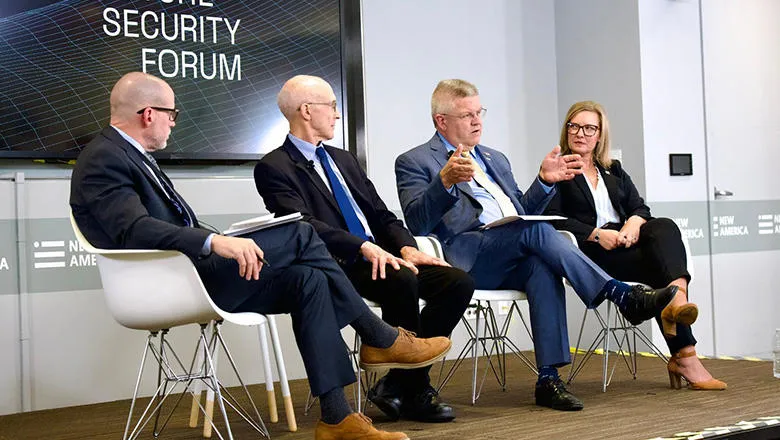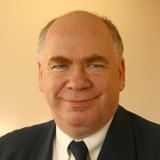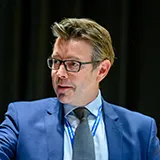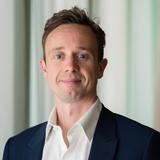“We [the United States] are already behind, it’s much cheaper to prevent war than to have to fight one. We have a lot of work to do to strengthen our defence”
Lt. Gen. H.R. McMaster (U.S. Army, Ret.)
18 September 2024
King's and partners host critical discussions on global security in Washington D.C.
Security & Defence PLuS, a trilateral university partnership between King’s College London, Arizona State University (ASU) and the University of New South Wales (UNSW), joined partners in Washington D.C. to host the Future Security Forum.

Policymakers, government and military leaders, experts and analysts gathered in Washington to explore global security, including U.S. foreign policy, relations with China, future security challenges, the war in Ukraine and the Indo-Pacific region.
On the first day of the Future Security Forum, discussions centred on how global security has evolved over the past decade and how it will continue to change in the coming decade. The second day of the event focused on security and stability in the Indo-Pacific. Notable speakers over the two days included former National Security Advisor of the United States Lt. Gen. H.R. McMaster, Vice Chairman of the Joint Chiefs of Staff Admiral Christopher W. Grady, Australia's Ambassador to the United States Kevin Rudd and Professor Sir Lawrence Freedman, Emeritus Professor of War Studies at King’s College London.
The forum was held at the offices of the Washington D.C.-based think tank, New America, which jointly hosted the first day on 9 September with Arizona State University (ASU) to mark their ten-year partnership through the Future Security programme.
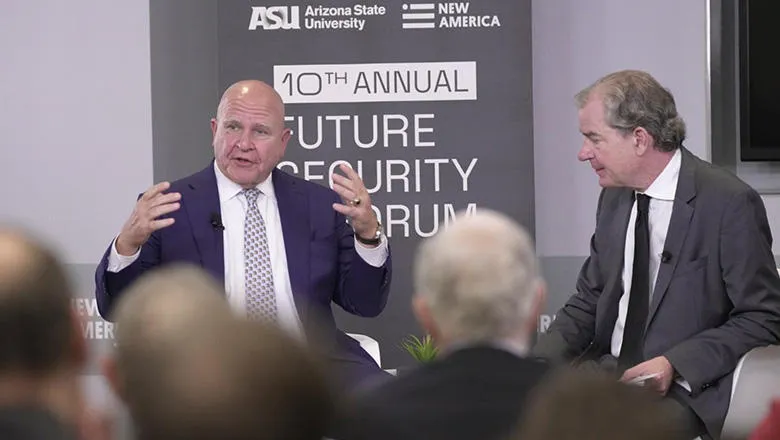
Lt. Gen. H.R. McMaster (U.S. Army, Ret.) joined Vice President of New America and CNN reporter Peter Bergen for a conversation on the past and future of US foreign policy, drawing on McMaster's experiences in the Trump White House.
Admiral Christopher W. Grady shared valuable insights on preparing for future security challenges and best-selling author Dmitri Alperovitch spoke to attendees about US-China relations, which he described as in a “cold war.”
“We have a global competition for supremacy with China playing out in every single corner of the world...in the military sphere, diplomatic sphere, technology, geopolitics, economics… We should not shy away from the cold war label.”
Dmitri Alperovitch, Chairman of Silverado Policy Accelerator and Founder of CrowdStrike.
The conflict in Ukraine was a common thread throughout many sessions across the two days. In his keynote speech, Sir Lawrence Freedman focused on Russia’s invasion of Ukraine and the technological advancements and innovation which have been witnessed during the conflict.
The event also included discussions on critical topics including political violence, climate change, the future of Afghanistan, hostage recovery and pandemic preparedness.
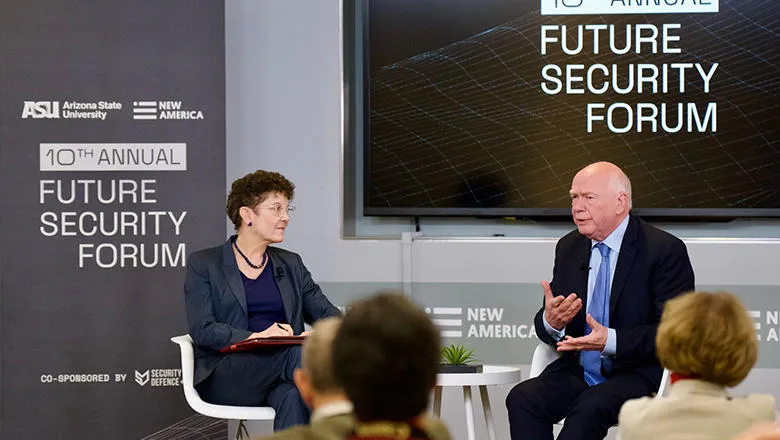
The second day of the Future Security Forum, led by Security & Defence PLuS, had a regional focus, with leaders, academics and military personnel discussing Indo-Pacific security and stability. In the spirit of the UK – US – Australia university partnership, the conversations focused on the AUKUS agreement – a trilateral security pact signed between the governments of the three nations in 2021.
Brig (R'td) Dr Ian Langford, Director of Security & Defence PLuS, outlined how Security & Defence PLuS will harness the expertise of King's, ASU, UNSW, and the higher education sectors of all three countries to address global security challenges.
The event included a panel discussion on the political resilience of AUKUS with perspectives from the British Embassy in DC, alongside a US state department representative and experts from Australia. Attendees also heard about intelligence sharing from former senior British Diplomat Sir Simon Gass and retired Vice Admiral Ann Rondeau, President of Naval Postgraduate School.
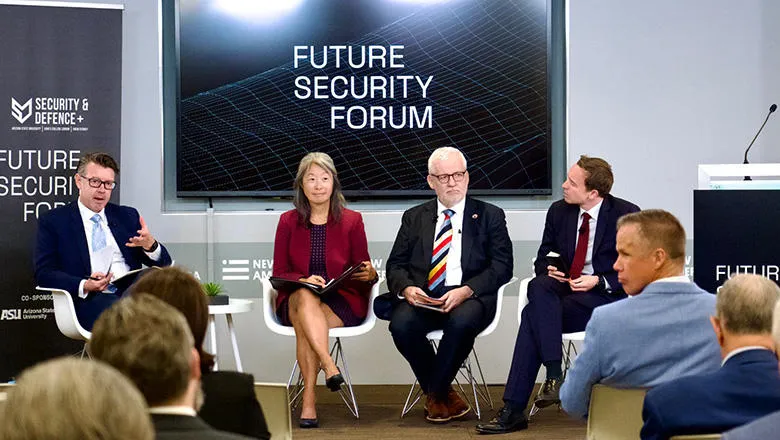
Professor Wyn Bowen, Head of the School of Security Studies at King’s College London, chaired a panel on alliances and diplomacy. During the discussion, Professor John Bew, a King’s historian and the current Defence Security Advisor to Prime Minister Keir Starmer, provided insights from the UK, while counterparts focused on Japan and Australia
“Brexit... is a considerable factor which led to a renewed debate about Britain’s place in the world.”
Professor John Bew, Defence Security Advisor to the UK Prime Minister
The day’s keynote speech was delivered by Australian Ambassador to the United States and former Australian Prime Minister Kevin Rudd. Ambassador Rudd said that AUKUS and other regional geopolitical agreements have presented “a much more complex picture” for Beijing to assess.
The forum concluded with a panel on AUKUS industry challenges and opportunities, and a discussion on regional approaches to Indo-Pacific security, featuring the Philippines Ambassador to US and a senior military representative from the Japanese embassy.
“The Philippines hasn’t faced this type of challenge since World War Two.”
Jose Manuel G. Romualdez, Ambassador of the Republic of the Philippines to the United States
The aim of the Future Security Forum is to provide a vital platform for global leaders, policymakers and academics to engage in critical discussions on emerging security challenges. As a key partner, King’s College London, through Security & Defence PLuS, demonstrated its ongoing commitment to dialogue, collaboration and innovation to address the complexities of a rapidly changing world.
